cern-, cert-, cer-; cret-, creet-, cre-
(Latin: to separate, to sift, to distinguish, to understand, to decide, to determine; separated, separation, to set apart; the glandular extraction or the movement out of a natural substance)
Used to express the ability a person has to distinguish, or to perceive, something with the eyes and the mind. Related to crit-; as in criticize, diacritical, critique, etc.
concerning (adjective), more concerning, most concerning
To do with or involving something or someone: Concerning the financial situation, we need to have more jobs.
1. An event where an individual musician or a group of musicians; such as, a choir, band, or orchestra, that performs in front of an audience.
2. Harmony or accord; for example, in purpose or action: "We finally had a concert of agreement."
3. A combination of people or things in agreement or harmony.
4. Etymology: 1665, from French and Itatian concerto, "concert, harmony"; from concertare "bring into agreement," in Latin, "to contend, to contest"; from com-, "with" + certare, "to contend, to strive"; a form of certus, a variation of cernere, "to separate, to decide".
2. Harmony or accord; for example, in purpose or action: "We finally had a concert of agreement."
3. A combination of people or things in agreement or harmony.
4. Etymology: 1665, from French and Itatian concerto, "concert, harmony"; from concertare "bring into agreement," in Latin, "to contend, to contest"; from com-, "with" + certare, "to contend, to strive"; a form of certus, a variation of cernere, "to separate, to decide".
concerted (adjective), more concerted, most concerted
Pertaining to doing something by agreement or in combination together as a group: When working on the geography project, the four students made their concerted efforts to organize and to present their report about the Mojave Desert to their geography class.
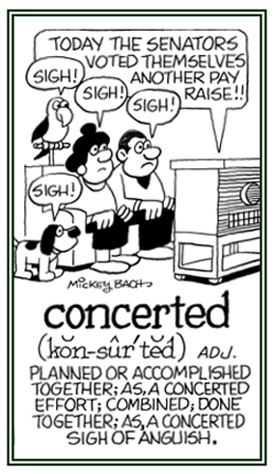
© ALL rights are reserved.
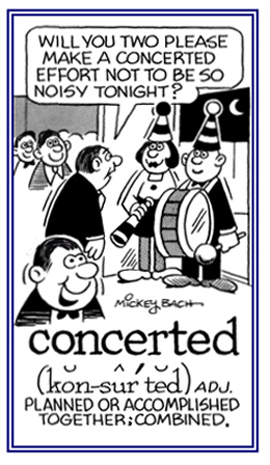
© ALL rights are reserved.
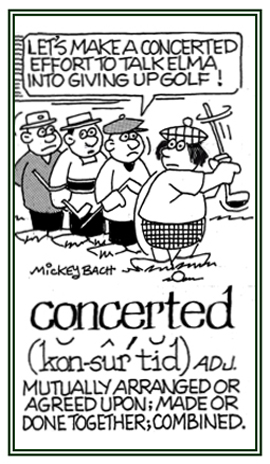
© ALL rights are reserved.
Go to this Word A Day Revisited Index



Go to this Word A Day Revisited Index
so you can see more of Mickey Bach's cartoons.
1. A small accordion with button keys consisting of a free-reed instrument played like an accordion by pushing its ends together to force air through the reeds.
2. Etymology: used since 1837, from concert + the feminine ending -ina.
2. Etymology: used since 1837, from concert + the feminine ending -ina.
A portable musical instrument invented by Sir Charles Wheatstone, 1829.
decern (verb), decerns; decerned; decerning
Rare, an archaic spelling of discern.
1. To proclaim, to declare, or to pronounce something by an authority.
2. A statement presented by a court of law regarding a legal action.
3. Etymology: used since 1303, from Old French decre, a variant of decret; from Latin decretum, neuter of decretus, from decernere, "to decree, to decide, to pronounce a decision"; from de-, "down" + cernere, "to separate".
2. A statement presented by a court of law regarding a legal action.
3. Etymology: used since 1303, from Old French decre, a variant of decret; from Latin decretum, neuter of decretus, from decernere, "to decree, to decide, to pronounce a decision"; from de-, "down" + cernere, "to separate".
1. In the Roman Catholic Church, a decree; especially, a papal letter giving a decision on a point or question of canon law.
2. Etymology: Middle English, from Old French decretale, previously from Late Latin decretalis, "fixed by decree", from Latin decretum, "principle, decision".
2. Etymology: Middle English, from Old French decretale, previously from Late Latin decretalis, "fixed by decree", from Latin decretum, "principle, decision".
discern (verb), discerns; discerned; discerning
1. To see something that is not very clear or obvious.
2. To understand something that is not immediately obvious.
3. To be able to tell the difference between two or more things.
4. To distinguish something apart from its surroundings or background.
2. To understand something that is not immediately obvious.
3. To be able to tell the difference between two or more things.
4. To distinguish something apart from its surroundings or background.
1. Anyone who sees, discovers, or distinguishes; such as, an observer.
2. Someone who knows and judges or who has the power of distinguishing: "He was a great observer and discerner of men's natures and humors."
3. That which distinguishes or causes understanding.
2. Someone who knows and judges or who has the power of distinguishing: "He was a great observer and discerner of men's natures and humors."
3. That which distinguishes or causes understanding.
discernible, discernable (adjective); more discernible, more discernable; most discernible, most discernable
Able to be seen, recognized, or understood; perceptible: Tom's handwriting was hardly discernible and Mrs. Smart could hardly read it!
discernibly (adverb), more discernibly, most discernibly
1. Referring to how something is obvious or noticeable to the intellect or senses: Even after practicing piano so much, Mary's spirit was discernibly overcome with sadness.
2. Concerning how something or someone is seen or visible: After their hike up the mountain, Jack and Jill mentioned to their friends that the mountain tops were discernibly perceptible above the layer of fog stretching across the landscape.
2. Concerning how something or someone is seen or visible: After their hike up the mountain, Jack and Jill mentioned to their friends that the mountain tops were discernibly perceptible above the layer of fog stretching across the landscape.
discerning (adjective), more discerning, most discerning
1. A reference to good judgment and good taste: A discerning mind is known to determine the best way of doing something.
2. Descriptive of showing keen insight and making good decisions: The discerning mechanic was able to quickly determine what was wrong with David's car when it wouldn't start and to fix the problem.
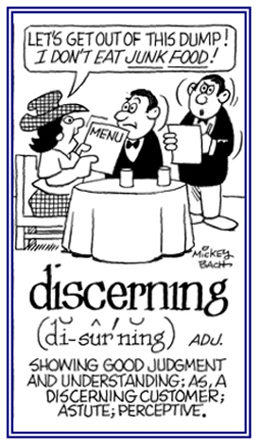
© ALL rights are reserved.
Go to this Word A Day Revisited Index
2. Descriptive of showing keen insight and making good decisions: The discerning mechanic was able to quickly determine what was wrong with David's car when it wouldn't start and to fix the problem.

Go to this Word A Day Revisited Index
so you can see more of Mickey Bach's cartoons.
1. The ability to see and to understand people, things, or situations clearly and intelligently: Jake's lack of discernment led to his disastrous choice of business partners.
2. The act or process of perceiving something or exhibiting keen insight and good judgment: Gertrude was studying at the university so she could have a better discernment regarding the best vocational career to strive for.
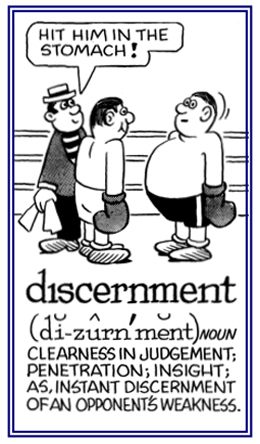
© ALL rights are reserved.
Go to this Word A Day Revisited Index
2. The act or process of perceiving something or exhibiting keen insight and good judgment: Gertrude was studying at the university so she could have a better discernment regarding the best vocational career to strive for.

Go to this Word A Day Revisited Index
so you can see more of Mickey Bach's cartoons.
disconcert (verb), disconcerts; disconcerted; disconcerting
1. To make someone feel upset or embarrassed: News about Marie's car accident as she was driving to work was disconcerting her employer very much.
2. Making a person feel ill at ease and slightly confused: The news that his scheduled flight had been canceled again disconcerted the salesman who had arranged an important meeting with a company executive.
3. To disturb or to make other people feel uncomfortable: The financial situation around the world has disconcerted many nations.
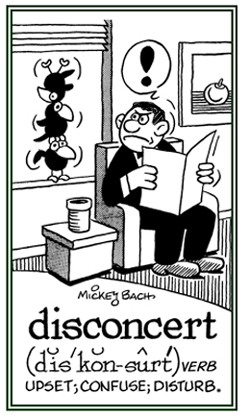
© ALL rights are reserved.
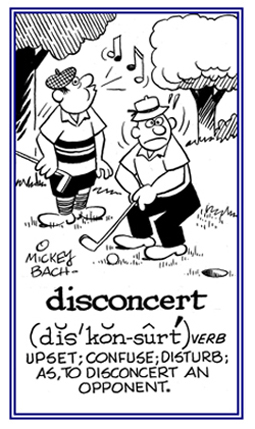
© ALL rights are reserved.
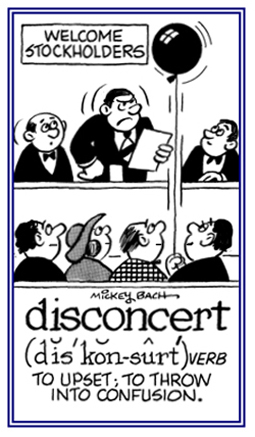
© ALL rights are reserved.
Go to this Word A Day Revisited Index
2. Making a person feel ill at ease and slightly confused: The news that his scheduled flight had been canceled again disconcerted the salesman who had arranged an important meeting with a company executive.
3. To disturb or to make other people feel uncomfortable: The financial situation around the world has disconcerted many nations.



Go to this Word A Day Revisited Index
so you can see more of Mickey Bach's cartoons.
disconcertedly (adverb), more disconcertedly, most disconcertedly
A reference to the frustration a person has about making plans and having them thrown fall apart: The airline flights back home were disconcertedly not scheduled until three weeks later.


